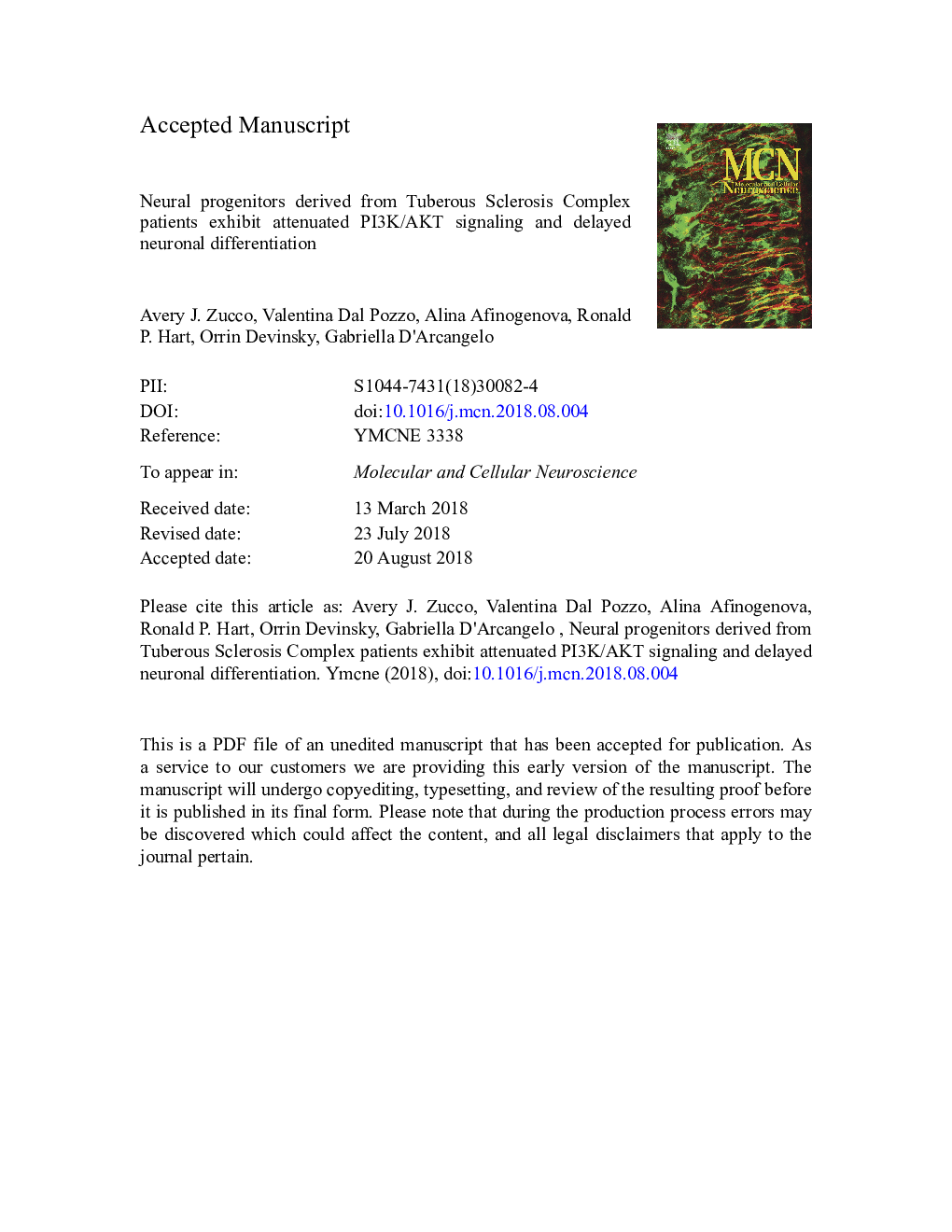| کد مقاله | کد نشریه | سال انتشار | مقاله انگلیسی | نسخه تمام متن |
|---|---|---|---|---|
| 9954520 | 1551115 | 2018 | 40 صفحه PDF | دانلود رایگان |
عنوان انگلیسی مقاله ISI
Neural progenitors derived from Tuberous Sclerosis Complex patients exhibit attenuated PI3K/AKT signaling and delayed neuronal differentiation
دانلود مقاله + سفارش ترجمه
دانلود مقاله ISI انگلیسی
رایگان برای ایرانیان
کلمات کلیدی
PI3KSRY-Box 2Human iPSCNDMmTORC1Sox2MAP2TBSTPax6IPSCsGDNFDcxECLTSCDMEMRNA-seqHRPPBSmTORnESBDNF - BDNF یا فاکتور نورونزایی مشتقشده از مغز GTPase Activating Protein - GTPase فعال کردن پروتئینDulbecco's modified Eagle's medium - Medal of Eagle اصلاح شده DulbeccomTOR complex 1 - mTOR پیچیده 1NPCs - NPC هاSENS - SENSEloss of heterozygosity - از دست دادن هتروزیگوتیسمenhanced chemiluminescence - بهبود شیمیایی لومنRNA sequencing - ترتیب RNANeuronal differentiation - تمایز نورونPaired box 6 - جعبه زوج 6doublecortin - دوچرخهBrain development - رشد مغز Induced pluripotent stem cells - سلول های بنیادی پرتوان القاییNeural progenitor cells - سلولهای پیش گیاه عصبیGAP - شکافglia-derived neurotrophic factor - فاکتور نوروترفیک مشتق گلیاBrain-derived neurotrophic factor - فاکتور نوروتروفی مشتق شده از مغزPhosphate buffered saline - فسفات بافر شورphosphoinositide 3-kinase - فسفینوزیتید 3-کینازLOH - لوهانnestin - نستینNEM - نهSignal transduction - هدایت سیگنالmammalian target of rapamycin - هدف پستانداران رپامایسینGene ontology - هستیشناسی ژنیtub - وانHorseradish peroxidase - پراکسیداز هوررادیشmicrotubule-associated protein 2 - پروتئین مرتبط با میکروتوبول 2Tuberous sclerosis complex - کمپلکس توبروس اسکلروزیس
موضوعات مرتبط
علوم زیستی و بیوفناوری
بیوشیمی، ژنتیک و زیست شناسی مولکولی
بیولوژی سلول
پیش نمایش صفحه اول مقاله

چکیده انگلیسی
Tuberous Sclerosis Complex (TSC) is a disease caused by autosomal dominant mutations in the TSC1 or TSC2 genes, and is characterized by tumor susceptibility, brain lesions, seizures and behavioral impairments. The TSC1 and TSC2 genes encode proteins forming a complex (TSC), which is a major regulator and suppressor of mammalian target of rapamycin complex 1 (mTORC1), a signaling complex that promotes cell growth and proliferation. TSC1/2 loss of heterozygosity (LOH) and the subsequent complete loss of TSC regulatory activity in null cells causes mTORC1 dysregulation and TSC-associated brain lesions or other tissue tumors. However, it is not clear whether TSC1/2 heterozygous brain cells are abnormal and contribute to TSC neuropathology. To investigate this issue, we generated induced pluripotent stem cells (iPSCs) from TSC patients and unaffected controls, and utilized these to obtain neural progenitor cells (NPCs) and differentiated neurons in vitro. These patient-derived TSC2 heterozygous NPCs were delayed in their ability to differentiate into neurons. Patient-derived progenitor cells also exhibited a modest activation of mTORC1 signaling downstream of TSC, and a marked attenuation of upstream PI3K/AKT signaling. We further show that pharmacologic PI3K or AKT inhibition, but not mTORC1 inhibition, causes a neuronal differentiation delay, mimicking the patient phenotype. Together these data suggest that heterozygous TSC2 mutations disrupt neuronal development, potentially contributing to the disease neuropathology, and that this defect may result from dysregulated PI3K/AKT signaling in neural progenitor cells.
ناشر
Database: Elsevier - ScienceDirect (ساینس دایرکت)
Journal: Molecular and Cellular Neuroscience - Volume 92, October 2018, Pages 149-163
Journal: Molecular and Cellular Neuroscience - Volume 92, October 2018, Pages 149-163
نویسندگان
Avery J. Zucco, Valentina Dal Pozzo, Alina Afinogenova, Ronald P. Hart, Orrin Devinsky, Gabriella D'Arcangelo,